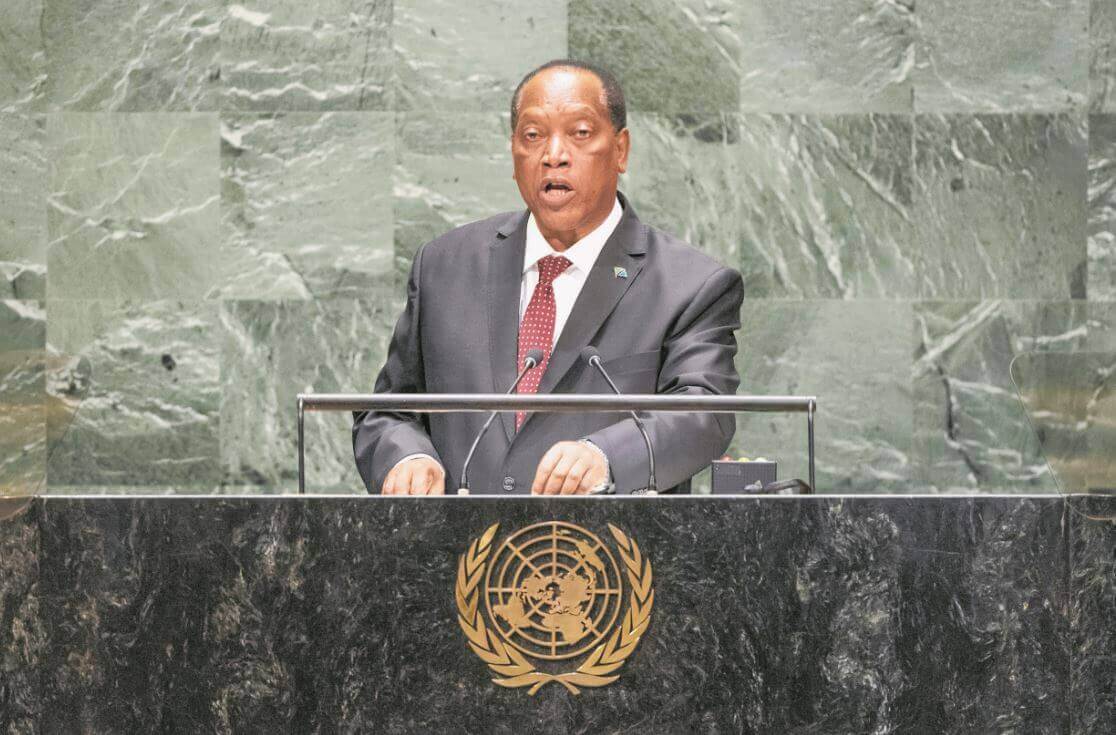
Our Projects are
Transforming African Trade
Quick Contacts
2nd Floor, Fidelity Insurance Centre Waiyaki Way, Westlands

TANZANIA has displayed before world leaders her great achievements in almost all sectors during President John Magufuli’s four-year reign.
Foreign Affairs and East African Cooperation Minister Professor Palamagamba Kabudi, addressing the 74th UN General Assembly in New York, highlighted measures by the government to eradicate poverty, offer quality education and health services, restore discipline in public service and improve the country’s infrastructure.
He said Tanzania has embraced new strategies to transform the country’s economy for welfare of all Tanzanians, especially the marginalised.
Prof Kabudi noted that the main agenda of the government is to eradicate corruption, institute ethics and discipline in public services as well as enhance tax collection to attain speedy socio-economic growth.
“The government has in the past four years lived up to its promises through services to the citizens in many aspects, good governance is critical in eradicating poverty and achieving social development,” he said, adding that president Magufuli’s administration has taken bold measures to fight corruption at all levels, including establishment of corruption and economic crimes division of the high court.
He told the world leaders from across the globe who gathered at the 74th session of the assembly that Tanzanian government has taken a number of measures to check wasteful public expenditures by improving fiscal discipline, enhancing accountability and transparency.
Minister Kabudi stated that the government has been executing various reforms, including proper management of natural resources by enacting laws to protect the country’s wealth.
He noted that the reforms and bold leadership have enabled the government to boost revenue collection from an average of 800bn/- to 1.3tri/-, monthly.
“Thanks to the new mining law, revenues from the mining sector have substantially increased,” he told the gathering, hinting that the high monthly collections have enabled the country to execute strategic infrastructure projects as well as improve social services.
He noted that since the government embarked on free education, pupils’ enrolment has increased by 35.2 percent at primary education level.
The move, he said, has enabled children from resource-deprived households and those living with disabilities to access basic education, saying the government allocates 23.87bn/- monthly to finance fee-free education programme.
In health, Professor Kabudi said the country based on universal health coverage scheme, with the government preparing two schemes— Community Health Fund (CHF) and National Health Insurance Fund (NHIF)—to increase the number of beneficiaries from 20 percent in 2015 to 33 percent, in 2019.
As of last March, 352 health facilities had either been constructed or rehabilitated and the government is currently building 67 new district hospitals.
“We have reformed procurement and logistic processes of medical supply and that has increased supply of medicines in health facilities in the country,” he said.
Regarding the energy sector, Prof Kabudi informed the gathering that the government is executing huge rural electrification projects, with a considerable number of villages having already been supplied with power since December 2015.
Over 67 percent of the population has access to electricity from less than 50 percent in 2015, he said.
To guarantee reliable and affordable energy, the minister said the government is implementing several power projects, including the multibillion shillings Julius Nyerere Hydropower Project, which upon completion will generate 2,115MW, more than the country’s current power production.
The world leaders heard that about 71 percent— compared to 56 percent in 2015—of the Tanzanian population has access to clean and safe water. Additionally, new water projects are being implemented, countrywide.
With regard to transport, the government has since December 2015 constructed over 2,000 kilometres of tarmac road and expanded major ports in Dar es Salaam, Zanzibar, Mtwara and Tanga.
“In August 2019, we inaugurated our new terminal III at Julius Nyerere International Airport in Dar es Salaam and expanded other airports in the country,” he said, adding that construction of Standard Gauge Railway’s (SGR) two phases along the central corridor, totaling 722 kilometres, is progressing well and is scheduled for completion by 2021, costing three billion US dollars.
Prof Kabudi further informed the global leaders that climate change and environmental conservation was one of the government’s priorities, asserting that 38.12 percent of the country’s total land was protected areas, including national parks, game reserves, and natural protected forests.
The country has established four new national parks, bringing the total number of parks to 24, protecting the country’s ecosystems, forests, biodiversity and land as part of environmental conservation.
The minister said on June 2019, Tanzania banned the use of plastic bags and is taking various measures to curtail fuel oil and diesel uses.
“The government is investing in renewable energy to reduce the impact of climate change but high costs of renewable energy technologies are constraining our efforts…we urge the international community to collaborate in making renewable technologies accessible and affordable,” he said.
Minister Kabudi reaffirmed Tanzania’s firm commitment to the promotion of democracy, good governance, human rights and rule of law. “Indeed, these democratic principles are well guaranteed in our constitution.
As I speak, there are 21 registered political parties in the country, operating freely and some are represented in parliament.
In the case of Tanzania Zanzibar, three opposition parties’ leaders are in government and one is here with us today,” he noted.
He argued that the country has vibrant and diversified media that represent different opinions as evidenced by 152 registered radio stations, with only three under state ownership.
Prof Kabudi argued against economic sanctions on Zimbabwe, saying the sanctions have been adversely affecting the hapless citizens of the Southern African nation.
“Tanzania, as chair of SADC, urges the international community to lift the sanctions on Zimbabwe,” argued Professor Kabudi.
Source: Dailynews
Disclaimer: The views and opinions expressed in this article are those of the authors and do not necessarily reflect the official policy or position of TradeMark Africa.